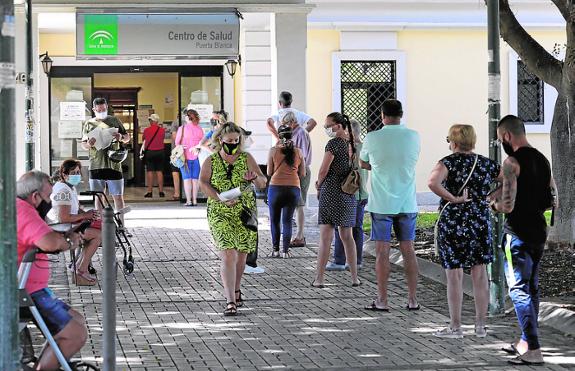Consultations, home visits and around eighty phone appointments: a normal working day for a local GP
Health care professionals spend a good part of their time tracing people who have been in contact with someone who has tested positive for Covid-19
Ivan Gelibter
Viernes, 11 de septiembre 2020, 12:45
Eighty-one phone calls are written in the diary of a GP in Malaga on a normal working day, and although that may seem a great many, most others who work in the health service deal with a similar number.
Nor is this all they do. They also see patients and make home visits, which explains why they are exhausted. In fact, for weeks GPs have been warning that most of the workload deriving from the coronavirus is being diverted to health centres, especially over the summer holiday period when the workload doubled because hardly any temporary cover was provided.
The new way of working introduced by the regional health service gives priority to consultations by telephone, but that isn't the specific reason that the lines are so busy. The main reason is that as well as their normal work, health care professionals are having to ring people who have been in close contact with someone who has tested positive for Covid-19, to ask them to have a test and remind them that they must go into self-isolation.
As the media have been reporting in recent weeks - and it is confirmed by unions and the Basta Ya platform as well as medical staff - the health centres are on the edge of collapse because they don't have the staff or materials they need. Although the Junta de Andalucía's Ministry of Health insists that 8,000 people are contact tracing in the region, the reality is that most of them are GPs who are having to do this in addition to their normal duties.
At present, there are three types of tracing being carried out: by private companies and insurance companies; epidemiological, arising from patients admitted to hospital; and those carried out by health centres, which are the majority.
Ana Duarte, the spokeswoman for the hospital section of the Sindicato Médico union, explains that there is currently a "bottleneck" at health centres due to the lack of staff and resources, such as sufficient phone lines.
In this situation, there are times when doctors are unable to ring everyone on the list in their diary, and in many cases this affects the monitoring of the virus. Because of this, some people who suspect they may be infected are going to the emergency departments at hospitals, where tests began to be carried out recently on people with no symptoms.
Last week, however, Ana Duarte warned that this would not be the best solution to the primary health care system being overwhelmed, and that there should be more people tracing contacts. She said the emergency units could also "collapse" if the need for tests continues to increase exponentially because health centres did not have the facilities to deal with the situation themselves.
"Since I came back from holiday I go to work every day feeling afraid of what I'm going to find," says María, a GP who prefers not to say which health centre she works at. It is, however, one of those where the situation is most difficult and at the moment has no appointments available for the next 14 days. Despite this, she was one of those who agreed to the Junta de Andalucía's request for GPs to work in the afternoons as well as the mornings, to clear the backlog.
This reaction from the Junta de Andalucía -it is not known how many doctors accepted the proposal - came at the end of August when it was clear that health centres were unable to cope with the normal workload and the contact tracing during normal hours. Even so, not all GPs were in favour of the measure because they considered that they were already doing their work in the mornings, attending to patients by phone and in person as well as speaking to those who had been in contact with positive Covid-19 cases, and say they were already doing quite enough.
Carmen García Úbeda, the president of the Basta Ya platform, says this situation affects doctors as well as people who use the public health system. "We can't go on with this situation where we are desperately worried that we are not going to be able to provide a service to everyone who needs it," she says.
